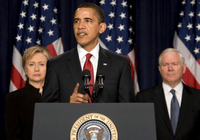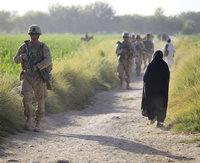Here are a few of this week’s highlights from WPR’s video section: – This Al Jazeera video breaks the story that Taliban leaders held a secret meeting in the Maldives to discuss Afghan President Hamid Karzai’s reintegration plan. – Two members of the Russian media discuss perceptions of President Barack Obama in Russia as well as U.S.-Russia relations in this WorldFocus video. -Secretary of State Hillary Clinton’s Internet freedom speech at the Newseum raised eyebrows in China.Our video sectionis updated daily. I’ll highlight videos we post there from time to timeon this blog. Got a tip for where we can […]
Afghanistan Archive
Free Newsletter
With the exception of a few details, it’s safe to say that the London conference on Afghanistan hit all the right notes, by which I mean the politically necessary ones. Afghanization will continue apace, regardless of the Afghans’ actual capacity to shoulder it, and negotiating with the Taliban has gotten the formal seal of approval, regardless of the Taliban’s actual willingness to negotiate. NATO can announce member states’ increased troop commitments, regardless of member states’ intentions of following through, while Western governments can simultaneous announce troop drawdowns over the course of 2011, regardless of whether the security situation permits them. […]
Has Washington removed the restraints on India’s response to future terror attacks originating from Pakistan? That’s what Ajai Shukla suggests in parsing a statement made by Defense Secretary Robert Gates during his recent visit to India. More significantly, says Shukla, Gates repeated the formula almost word for word days later in Pakistan, instead of walking it back for the Pakistani viewing audience. Was Washington merely waving the India stick to nudge Islamabad towardgreater cooperation in the Af-Pak war? Or, is the U.S. starting tobelieve that Islamabad is a lost cause, and that India can be used –not just politically and […]
The US is endorsing a plan to provide financial incentives to AfghanTaliban fighters to stop fighting and work with the government inKabul. For President Barack Obama, the plan appears to be an off-rampin an increasingly unpopular war, though paying off the Taliban won’tnecessarily go over well with Americans. Al Jazeera’s Rosiland Jordanreports.
Afghan President Hamid Karzai spoke about Afghan leadership andownership at the opening of the Afghanistan Conference in London.Karzai touched on his much publicized plan to re-integrate fellowAfghans into the government and mainstream society and applauded theefforts of the UN to take some Taliban members off of their blacklist.Karzai also said that Afghanistan is “looking forward to free and fairparliamentary elections,” continuing that the government plans to workwith the international community to prevent irregularities at the polls.

PRAGUE, Czech Republic — With all eyes on London and the high-profile Afghanistan Conference, a quieter gathering that took place this week in Prague might have shed more light on the opportunities, challenges and uncertainty that lie ahead for the war-torn country. The conference, co-sponsored by the Prague Security Studies Institute and Radio Free Europe/Radio Liberty, brought together military and civilian practitioners of reconstruction and development work in Afghanistan, ostensibly to discuss the future of Provincial Reconstruction Teams in Afghanistan. But the wide-ranging panel discussions also addressed the broader challenges of reconstruction, as well as the urgent need for overcoming […]
I must say, it really cracked me up that this (courtesy of SWJ) was the first thing I read after finishing my write-up of the Prague PRT conference: In exchange for their support, American commanders agreed to channel $1million in development projects directly to the tribal leaders andbypass the local Afghan government, which is widely seen as corrupt. Contrast that with this, from Prague: Dereck Hogan, senior governance adviser to Richard Holbrooke, describedPresident Barack Obama as being “seized by sub-national government,”and defined U.S. objectives as helping to make local government morevisible, accountable and capable. He outlined an impressive package ofprojects […]

HELMAND PROVINCE, Afghanistan — Marine Capt. Scott Cuomo of Fox company, 2nd battalion, 2nd Marine regiment, must have felt very confident. How else to explain his climbing into an armorless Afghan army truck — a coffin on four wheels — next to Haji Abdullah Jan, the Afghan district governor, with only a few Afghan army soldiers for protection, to speed down empty dirt roads almost certainly mined by the Taliban? But Cuomo’s confidence is not misplaced. The men make it safely to their destination: a destroyed compound beside which the barren, twisted remains of three dead trees point grotesquely to […]
Just a quick note to explain the light posting this week. I just got back from Prague, where I attended a “pre-London” conference on PRTs in Afghanistan organized by the Prague Security Studies Institute and Radio Free Europe/Radio Liberty. It was a very informative few days, with the panel presenters and audience made up almost exclusively of ground-level actors working in Afghanistan. I’ll be writing it up for the WPR front page tomorrow, so I don’t want to go into too much detail. But I’ll just note two initial impressions. First, when we hear about the lack of “unity of […]
Al Jazeera is reporting that secret talks among Taliban leadershas taken place in the Maldives. The meeting coincides with AfghanPresident Hamid Karzai’s introduction of a re-integration plan forTaliban fighters. The meeting, which sought to find a third solutionsomewhere between armed conflict and foreign occupation, took placewhile the U.N. removed some Taliban leaders from their blacklist. AlJazeera’s David Chater reports.
WorldFocus interviews Ahmad Kamal, Pakistan’s former Ambassador to theUnited Nations, and Hassan Abbas, a former Pakistani governmentofficial who is now with the Asia Society. The two experts say thoughU.S. foreign policy toward Afghanistan and Pakistan is still rooted inthe military approach of the Bush Doctrine, it is evolving in the rightdirection. Kamal says that a Taliban power-sharing approach is anecessary avenue to explore. He also adds that U.S. drones are moreharmful than helpful as the collateral damage they cause breeds disdainfor coalition forces.
NewsHour’s Margaret Warner interviews Luis Rueda, former deputydirector for counterintelligence at the CIA’s Counterterrorism Center.Rueda says that though Al Qaida’s command and control seem to haveweakened, they have adapted to fight a more fragmented war, focusing onsophisticated counter-intelligence operations. In response to thisstrengthening intelligence, the CIA is reviewing and vetting its ownagents to find out “who’s good, who’s bad and what the signs are,” saysRueda. The former field agent says that the CIA is keeping up with theterrorist organization, but that “it’s a race against time.”
Afghan Warlord Gulbuddin Hekmatyar shares his views on Afghan politics,the unraveling of Pakistan and foreign forces in Afghanistan. Hekmatyarsays that Pakistan has made grave mistakes by helping the UnitedStates, mistakes that will result in further national instability. Healso describes Hezb-e-Islami’s structure and power within Afghanistan.Hekmatyar claims that a majority of the country is in favor of theIslamist party.
A brazen, multiple-target, attack in the heart of Kabul has reminded the international community that if the Taliban wants, it can infiltrate and disrupt society, even in the most protected areas. Experts say the attack, though there were relatively few casualties, is worrisome from a psychological perspective. As Hamid Karzai was swearing in members of his cabinet, blasts outside were shining light on an inept government, struggling for legitimacy. NewsHour’s Margaret Warner reports.
Robert Grenier, the former chief counter-terrorism official at the CIA, talks to Al Jazeera’s David Foster about the agency’s efforts abroad. Though Grenier says that in some regions terrorist groups are gaining traction, he believes nationals in those countries are becoming increasingly resistant to the groups, forcing the organizations to operate from less governed areas such as within Yemen’s borders.
If you’re wondering how to say, “scathing,” in blog-ese, look no further: The Security Crank, at his cranky best, counts the ways in which former ISAF commander Gen. David McKiernan got majorly shafted. (And believe me, there are more than you probably realize.) All of which reminds me of the one-year window of opportunity often referred to last July to turn things around in Afghanistan. Six months later, the information ops campaign, at least, seems to be on track to deliver.
In his WPR column a few weeks back, David Axe called attention to South Korea’s promised troop deployment to Afghanistan, and it bears repeating, because I think it’s actually one of the more significant “quiet moves” to emerge recently. For more background on Seoul’s decision in the context of the U.S.-ROK alliance, see this March 2009 WPR briefing by Nirav Patel (itself based on this CNAS report). For a more ROK-centric analysis, there’s also this Asia Foundation article by Michael Finnegan — who notes that the operational capabilities the deployment will provide could have potential applications on the Korean Peninsula […]
